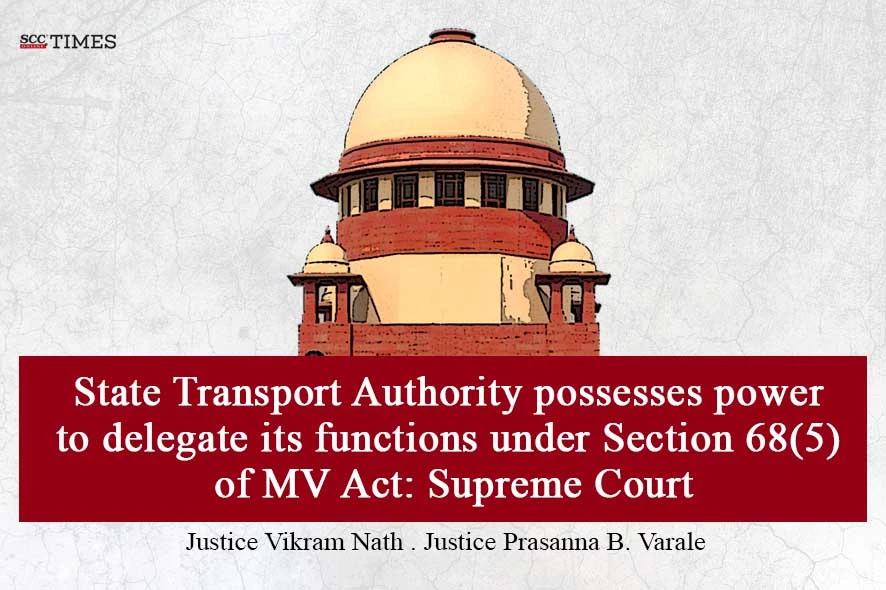Supreme Court: While considering the instant appeals the Court had to determine the following issues:
-
Constitutional validity of the Karnataka Motor Vehicles Taxation and Certain Other Law (Amendment) Act, 2003 (2003 Repeal Act) repealing the Karnataka Contract Carriages (Acquisition) Act, 1976 (KCCA Act), particularly given that the 1976 Act had earlier been upheld by the Supreme Court.
-
Whether, under Section 68(5) of the Motor Vehicles Act, 1988 (MV Act), read with Rule 56 of the KMV Rules, the State Transport Authority (STA) and Regional Transport Authorities (RTAs) can lawfully delegate the power to grant contract carriage permits (and related permits) to the Secretary, or whether such power must remain with the multi-member authorities due to its quasi-judicial character.
The Division Bench of Vikram Nath* and Prasanna B. Varale, JJ., upheld the constitutional validity of the 2003 Repeal Act. The Court further held that STA possesses the power to delegate its functions under Section 68(5) of the MV Act, as expressly provided by the statute and further clarified by Rule 56(1)(d) of the KMV Rules.
Background:
The KCCA Act was enacted with the objective of acquiring privately operated contract carriages to curb their alleged detrimental operation in the State and to bring them under public control. Under the KCCA Act, once these contract carriages were acquired, all corresponding permits as well as certificates of registration stood vested in the State Government. Subsequently, the State Government transferred these vehicles and permits to State-owned Road Transport Corporations, including the KSRTC. The KCCA Act was challenged before the Supreme Court, however the Court upheld its validity in State of Karnataka v. Ranganatha Reddy, (1977) 4 SCC 471.
Thereafter in 1988, the MV Act came into being. Section 2(7) defines “Contract carriage” and Section 2(40) defines “Stage Carriage.” Moreover, Section 68 deals with transport authorities; in particular, Section 68(2) provides for the composition of the STA and RTA mandating that each include a Chairman with judicial experience along with other members—up to four for the STA and up to two for the RTA. Section 68(3)(b) empowers the STA to perform the duties of the RTA, and Section 68(5) enables both authorities, under rules made pursuant to Section 96, to delegate their powers and functions to any other authority or person subject to prescribed restrictions. Under Karnataka Motor Vehicle Rules, 1989, the RTA and STA were empowered to delegate their powers to their secretaries, including the authority to grant contract carriage permits.
In subsequent decades, it was observed that in many rural and semi-urban areas, a shortage of KSRTC-run buses compelled travellers to rely on private goods vehicles, tractors, or other suboptimal modes of travel, raising concerns of safety and inconvenience. Therefore, the Karnataka Motor Vehicles Taxation and Certain Other Law (Amendment) Act, 2003 was enacted that repealed the KCCA. The objective of the 2003 Repeal Act was to liberalize public transport, encourage private operators, and address “woeful shortages” in passenger services.
Several writ petitions challenging the 2003 Repeal Act was filed before the Karnataka High Court. The Division Bench of the High Court on 28-3-2011 upheld the repealing of KCCA Act. However, the Division Bench rejected the argument that the STA (or RTA) could delegate contract carriage permit issuance to the Secretary. It held that permit granting under Chapter V is a quasi-judicial function requiring collective adjudication or at least decision-making by the statutory authority itself. The High Court thus invalidated the relevant portion of the KMV Rules (Rule 56). The Division Bench concluded that the “Secretary alone” approach improperly bypassed the multimember scheme envisaged by the MV Act.
Aggrieved by the afore-stated decision, the present appeals came into being.
Court’s Assessment:
Vis-a-vis validity of 2003 Repeal Act, the Court said that the power to repeal a law is coextensive with the power to enact it. In this context, the KCCA Act was enacted under Entry 42 of the Seventh Schedule of the Constitution. The KCCA Act was designed to bring privately operated contract carriages under state control in order to serve the public interest and to implement the Directive Principles of State Policy, notably under Article 39(b) and (c) of the Constitution. However, over the ensuing decades, the transport landscape in Karnataka underwent significant changes—urbanization intensified, public transport demand grew, and it became increasingly evident that the restrictive regime established by the KCCA Act was contributing to an artificial scarcity of public transport services, particularly in rural and semi-urban areas.
In response to the afore-stated evolving circumstances, the Legislature exercised its plenary power by enacting the 2003 Repeal Act, which repealed the KCCA Act. The repeal was not an arbitrary act of legislative whim but was backed by a clear statement of objects and reasons that identified the deficiencies in the existing regulatory framework and the necessity to liberalize the transport sector. “The intention was to dismantle the statutory monopoly that the KCCA Act had created for the KSRTC and to open the door for private operators to address the burgeoning public transport needs”.
A repeal statute does not recreate the legal framework anew but rather extinguishes the earlier Act’s operative provisions; it is not subject to the same procedural requirements as an original enactment when it comes to the need for fresh assent, provided that the repeal falls within the legislative competence of the State. Furthermore, the 2003 Repeal Act is rooted in the practical realities of modern transport policy. Contemporary challenges, such as increasing demand for public transport services, congestion in urban areas, and the need for efficient service delivery, necessitated a more flexible regulatory regime. The repeal of the KCCA Act was thus a deliberate policy decision aimed at fostering a more dynamic and responsive transport framework rather than an attempt to nullify well-established judicial pronouncements.
The KCCA Act was enacted under Entry 42 (Acquisition and Requisition of property), and its repeal by the 2003 Repeal Act was done under Entry 57 of List II, which deals with taxation—a subject area where the State has independent legislative competence. The repeal does not alter or contradict the judicial interpretation of the KCCA Act; rather, it reflects a conscious legislative choice to adapt to new economic and social conditions.
The Court thus found that the 2003 Repeal Act was sound and consistent with the principles of legislative power.
Regarding the second issue of delegation of power to grant permits, the Court noted that Section 68(5) of MV Act unambiguously confers upon the STA and RTA the power to delegate its functions provided that rules are framed under Section 96 of the Act. In the present context, the delegation in question concerns the grant of permits that are not stage carriage permits. The language of Rule 56(1)(d) of KMV Rules explicitly differentiates between the grant of stage carriage permits, which involve complex and inherently quasi-judicial considerations, and other types of permits that are essentially administrative in nature. The fact that only the grant of stage carriage permits is excluded from delegation underscores the Legislature’s intention: routine and time-sensitive permits such as contract carriage, special, tourist, and temporary permits can be efficiently processed through delegation to a competent officer like the Secretary, thereby ensuring that administrative functions are not unduly delayed by the need for a full board’s involvement.
The Court pointed out that Section 68(5) of the MV Act, coupled with the specific language of Rule 56(1)(d) of the KMV Rules makes it clear that the Legislature intended for the STA to delegate certain routine permit functions. The exclusion of stage carriage permits from this delegation does not imply that all permit functions are inherently non-delegable; rather, it reflects a calibrated approach that distinguishes between complex adjudicatory functions and routine administrative tasks.
Furthermore, from a practical standpoint, the STA is entrusted with a wide range of responsibilities under the Motor Vehicles Act, and its workload necessitates delegation to ensure timely service delivery. The Secretary, being a high-ranking officer with substantial expertise in transport administration, is well equipped to handle routine permit applications. The delegation mechanism is not a blank check for arbitrary decision-making; it operates within the boundaries and conditions prescribed by the enabling rules framed under Section 96 of the MV Act. This ensures that, while administrative efficiency is achieved, there remains adequate oversight and accountability through the broader STA framework.
The Court pointed out that the High Court’s reasoning in this regard appears to have conflated the inherent quasi-judicial nature of certain decisions with the broader statutory power of delegation. The High Court held that because permit-granting is quasi-judicial, it cannot be delegated to a single officer. However, this view fails to recognize that delegation does not remove judicial oversight from the process; instead, it merely streamlines routine functions that do not require the full deliberative process of the STA.
The practical impact of not allowing delegation would be to overload the STA with routine functions, potentially causing undue delays and inefficiencies in the permit-issuance process. Such delays could disrupt the balance of public transport service delivery, which the Legislature clearly sought to improve by liberalizing the regime for non-stage carriage permits. In this light, the delegation of routine permit-granting powers is not only legally permissible but is also necessary to meet the practical demands of an evolving transport sector.
Therefore, the power of the STA to delegate the issuance of contract carriage, special, tourist, and temporary permits to its Secretary is fully supported by the statutory provisions of Section 68(5) of the MV Act, and Rule 56(1)(d) of the KMV Rules, 1989. The delegation is a rational and necessary administrative measure that facilitates prompt and efficient processing of permit applications without undermining the oversight function of the STA.
CASE DETAILS
|
Citation: Appellants : Respondents : |
Advocates who appeared in this case For Petitioner(s): For Respondent(s): |
CORAM :








